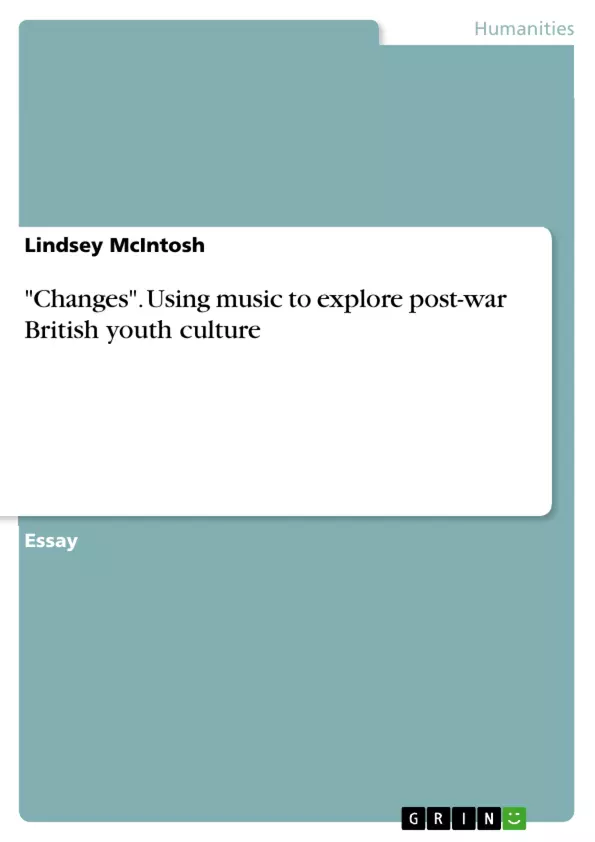When the American director John Hughes chose to open the credits of his 1985 film "The Breakfast Club" with following lyrics taken from David Bowie’s 1971 single "Changes", his intention in doing so was to challenge the commonplace notions of youth plaguing 1980s teen-culture in America.
"And these children that you spit on as they try to change their worlds, Are immune to your consultations – they’re quite aware of what they’re going through…"
The film’s troubled ‘teenage’ protagonists, exaggerated caricatures of rebellious youth who spend an entire Saturday detention within a school library in atonement for their individual delinquencies, begin their journey defined ‘in the simplest terms and the most convenient definitions’ lavished upon them by their adult authorities. Bowie’s lyrics were applied to "The Breakfast Club" by Hughes in order to glamorize the notion of ‘us versus them’ and youth isolation within the cultural landscape of 1980s America. However, these lyrics can also be aptly applied to the much-discussed issue of ‘youth culture’ within the British post-war landscape. Although ‘Changes’ was not released until the early 1970s, its lyrics effectively capture the tone of the previous two decades in Britain; decades in the throes of social and political change, with a newly formed ‘youth’ group who were becoming increasingly aware of that fact.
Following the arrival of rock n’ roll in the late 1950s, British youths underwent a period of self-realisation in the 1960s as music, particularly rock n’ roll, drove a wedge between teenagers and the ‘parent culture’, effectively isolating them into their own unique cultural island. The primary ambition of this essay, therefore, will be to assess the change implemented by music during these post-war decades and whether it is possible to utilize music as a tool for effectively understanding youth culture and sub-cultures. Although each decade could be argued to embody its own distinct ‘mood’, effectively captured and echoed in its musical output, this essay will hone its energies primarily towards studying the late 1950s and early 1960s, in which a ‘fizzy electrical storm’ of a radiant post-war atmosphere was reflected and charged by its music. [...]
Inhaltsverzeichnis (Table of Contents)
- Music as a Tool for Understanding Youth Culture in Post-War Britain
- The Rise of Rock n' Roll and its Influence on Youth Culture
- Music as a Dividing Line Between Generations
- The Teenage Consumer Market and the Rise of 'Youth Music'
- The Significance of Music in the 1960s
- The Impact of American Music on British Youth Culture
- Moral Panic and the Perpetuation of Negative Perceptions of Rock Music
Zielsetzung und Themenschwerpunkte (Objectives and Key Themes)
This essay aims to evaluate the impact of music on youth culture in post-war Britain and explore whether music can be used as a tool to understand youth culture and its subcultures. It focuses primarily on the late 1950s and early 1960s, a period marked by social and political change and the emergence of a distinct youth generation.
- The role of music in shaping youth identity and cultural distinction
- The impact of rock n' roll on youth culture and its relationship to social and political change
- The use of music as a tool for understanding youth subcultures
- The relationship between music, youth culture, and consumerism
- The perception and portrayal of rock music in the media and its influence on public opinion
Zusammenfassung der Kapitel (Chapter Summaries)
The essay begins by exploring the concept of youth culture in post-war Britain and the significance of music in understanding this phenomenon. It argues that despite the complexity of defining youth culture, music has been marginalized as a tool for deconstructing and understanding its subcultures.
The essay then delves into the rise of rock n' roll in the late 1950s and its impact on youth culture. It discusses the introduction of rock n' roll as a distinctive soundtrack for a newly formed teenage generation, highlighting its role in creating a cultural divide between youth and the "parent culture".
The essay further examines the association of music with youth, emphasizing the unique properties of certain musical genres that contribute to defining youth as a distinct sociocultural category. It explores the evidence of a burgeoning teenage consumer market in the 1950s, where music played a significant role in spending patterns.
The essay concludes by examining the role of music in the 1960s and the impact of American music on British youth culture. It discusses the controversy surrounding rock music and the emergence of "moral panic" surrounding its perceived negative influence on youth.
Schlüsselwörter (Keywords)
The main keywords and focus topics of the text include: youth culture, post-war Britain, rock n' roll, music, subcultures, social change, consumerism, teenage culture, moral panic, media representation, cultural distinction, generational divide.
How did music influence British youth culture post-war?
Music, especially Rock n' Roll, acted as a catalyst for self-realization, creating a distinct cultural identity for teenagers and a divide from the "parent culture."
Why are David Bowie's lyrics in "Changes" significant?
The lyrics capture the tone of social and political change in Britain, highlighting a youth group increasingly aware of their own world and challenges.
What is the "moral panic" regarding Rock n' Roll?
It refers to the negative perception and fear among adults and media that Rock music was a corrupting influence on the youth generation.
Can music be used as a tool to understand subcultures?
Yes, the essay argues that musical output effectively captures and echoes the distinct "mood" and values of different youth decades and subcultures.
How did the teenage consumer market rise in the 1950s?
Economic changes led to a burgeoning market where "youth music" became a primary commodity, further isolating the youth as a unique category.



